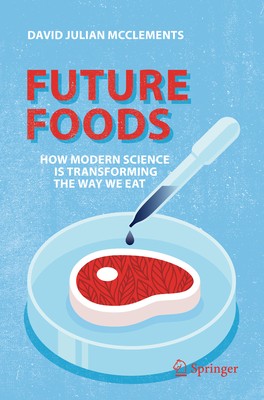
- We will send in 10–14 business days.
- Author: David Julian McClements
- Publisher: Copernicus Books
- ISBN-10: 3030129942
- ISBN-13: 9783030129941
- Format: 19.6 x 23.1 x 2 cm, minkšti viršeliai
- Language: English
- SAVE -10% with code: EXTRA
Reviews
Description
We are in the midst of an unprecedented era of rapid scientific and technological advances that are transforming the way our foods are produced and consumed. Food architecture is being used to construct healthier, tastier, and more sustainable foods. Functional foods are being created to combat chronic diseases such as obesity, cancer, diabetes, stroke, and heart disease. These foods are fortified with nutraceuticals or probiotics to improve our mood, performance, and health. The behavior of foods inside our guts is being controlled to increase their healthiness. Precision nutrition is being used to tailor diets to our unique genetic profiles, microbiomes, and metabolisms. Gene editing, nanotechnology, and artificial intelligence are being used to address modern food challenges such as feeding the growing global population, reducing greenhouse gas emissions, reducing waste, and improving sustainability. However, the application of these technologies is facing a backlash from consumers concerned about the potential risks posed to human and environmental health.
Some of the questions addressed in this book are: What is food architecture? How does sound and color impact taste? Will we all have 3D food printers in all our homes? Should nanotechnology and gene editing be used to enhance our foods? Are these new technologies safe? Would you eat bug-foods if it led to a more sustainable food supply? Should vegetarians eat themselves? Can nutraceuticals and probiotics stop cancer? What is the molecular basis of a tasty sustainable burger?
David Julian McClements is a Distinguished Professor in food science who has used physics, chemistry, and biology to improve the quality, safety, and healthiness of foods for over 30 years. He has published over 900 scientific articles and 10 books in this area and is currently the most highly cited food scientist in the world. He has won numerous scientific awards for his work. The aim of this book is to highlight the many exciting advances being made in the science of foods, and to show their application for solving important problems related to the modern food supply, such as tackling chronic diseases, feeding a global population, reducing food waste, and creating healthier and tastier foods.
EXTRA 10 % discount with code: EXTRA
The promotion ends in 23d.16:43:46
The discount code is valid when purchasing from 10 €. Discounts do not stack.
- Author: David Julian McClements
- Publisher: Copernicus Books
- ISBN-10: 3030129942
- ISBN-13: 9783030129941
- Format: 19.6 x 23.1 x 2 cm, minkšti viršeliai
- Language: English English
We are in the midst of an unprecedented era of rapid scientific and technological advances that are transforming the way our foods are produced and consumed. Food architecture is being used to construct healthier, tastier, and more sustainable foods. Functional foods are being created to combat chronic diseases such as obesity, cancer, diabetes, stroke, and heart disease. These foods are fortified with nutraceuticals or probiotics to improve our mood, performance, and health. The behavior of foods inside our guts is being controlled to increase their healthiness. Precision nutrition is being used to tailor diets to our unique genetic profiles, microbiomes, and metabolisms. Gene editing, nanotechnology, and artificial intelligence are being used to address modern food challenges such as feeding the growing global population, reducing greenhouse gas emissions, reducing waste, and improving sustainability. However, the application of these technologies is facing a backlash from consumers concerned about the potential risks posed to human and environmental health.
Some of the questions addressed in this book are: What is food architecture? How does sound and color impact taste? Will we all have 3D food printers in all our homes? Should nanotechnology and gene editing be used to enhance our foods? Are these new technologies safe? Would you eat bug-foods if it led to a more sustainable food supply? Should vegetarians eat themselves? Can nutraceuticals and probiotics stop cancer? What is the molecular basis of a tasty sustainable burger?
David Julian McClements is a Distinguished Professor in food science who has used physics, chemistry, and biology to improve the quality, safety, and healthiness of foods for over 30 years. He has published over 900 scientific articles and 10 books in this area and is currently the most highly cited food scientist in the world. He has won numerous scientific awards for his work. The aim of this book is to highlight the many exciting advances being made in the science of foods, and to show their application for solving important problems related to the modern food supply, such as tackling chronic diseases, feeding a global population, reducing food waste, and creating healthier and tastier foods.


Reviews